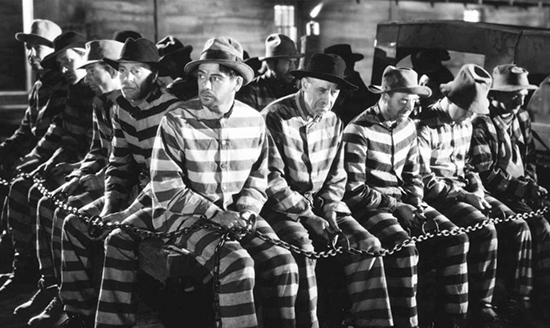Classic Hollywood: Most Wanted “Fugitive”

Like many actors, studios during Hollywood’s Golden Age were often typecast. MGM specialized in high-gloss escapism. Universal made spooky monster films. And Warner Bros.? They owned the gangster genre. But in 1932, Jack L. Warner and production chief Darryl F. Zanuck made the risky move to shoot a real-life drama then playing out in the headlines. Ignoring pleas from their own story department, which claimed the tale was too provocative, Warner and Zanuck greenlit I Am a Fugitive From a Chain Gang.
From its arresting title to its haunting final frame, Fugitive is a take-no-prisoners look at crime and punishment. Writer David Zinman captures the film’s raw power: “As a grim, stark document of social injustice, the movie had no peers in its day. Based on a true story, it awakened the nation to the brutal conditions of Southern prison camps.” Author Ted Sennett agrees, calling Fugitive “a searing study of injustice that created a public uproar and a clamor for immediate legislation.”
Fugitive was based on the case of Robert E. Burns, a con on the lam from the law. In 1922, the WWI veteran was lured into a grocery store heist by petty thieves he met in a flophouse. The robbery netted just $5.80, but Burns was sentenced to a six-to-ten-year hitch on a chain gang. After two months, he escaped. By 1929, Burns was a model citizen, living in Chicago….until Burns asked his wife for a divorce and she ratted him out to the cops. Burns returned to prison; a year later, he escaped again. While in hiding, Burns wrote his riveting memoir, I Am a Fugitive From a Georgia Chain Gang!
Paul Muni portrayed Burns (renamed James Allen on screen). The 37-year-old performer had gained fame in Scarface (1932), and later won an Academy Award for The Story of Louis Pasteur (1936). Muni is unforgettable in Fugitive, vanishing into the part and earning an Oscar nomination for his performance. According to Wikipedia, the actor privately met with Burns “to learn how [he] walked and talked, in essence, to catch ‘the smell of fear’…Muni [told] Burns, ‘I don’t want to imitate you. I want to be you.’”
Even today, Fugitive still packs a punch. Film critic Pauline Kael notes that it contains “one of the great closing scenes in the history of cinema”: When Allen briefly resurfaces under cover of darkness to say goodbye to the woman he loves, she asks, “How do you live?” and as Allen disappears into the shadows, we hear his shocking reply, “I steal!”
Fortunately for Warner Bros., the public flocked to the movie and Burns emerged from hiding to win his freedom. Professor John O’Connor writes: “We should not underestimate [the picture] as a forceful social document. There can be no doubt that, although liberals and intellectuals had known about the problem for years, the experience of seeing this film awakened millions of Americans to an issue and helped create the political climate in which real reform could eventually take place.”
Classic Hollywood posts appear bimonthly on The Music Hall blog.
